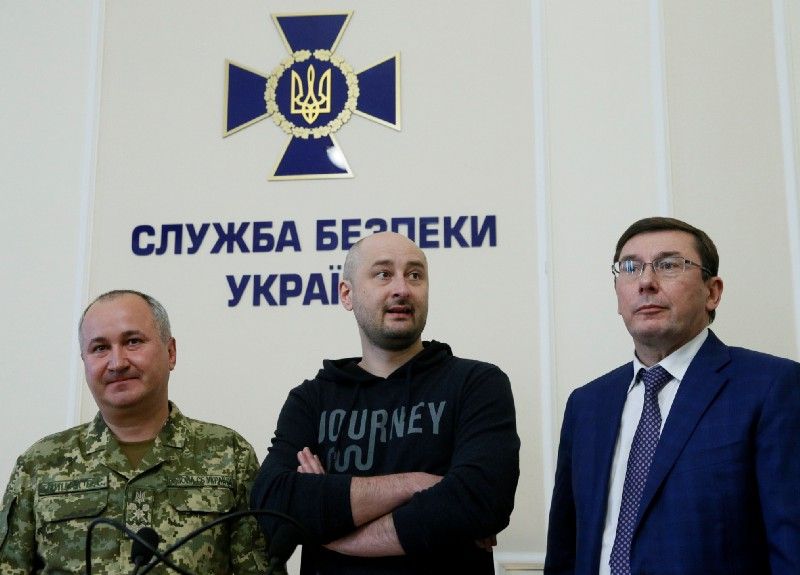On Tuesday evening, Ukrainian Prime Minister Volodymyr Groysman took to Facebook to accuse Russia of murdering dissident journalist Arkady Babchenko in Kyiv. Hours later, Babchenko (pictured above) walked into a press conference to announce that Ukrainian security services had, in fact, staged his “murder” to flush out a Russian hit squad operating in Kyiv.
The government’s story makes little sense — did they really need to fake a murder to catch a would-be killer? — and media organizations have roundly condemned the Ukrainian government for this stunt. But the Babchenko story highlights the confusion, deception, and (often justified) paranoia that still make Ukrainian politics so colorful.As it happens, your Friday author has just returned from 10 days travelling around Ukraine. A few trip highlights underline other aspects of life in today’s Ukraine:
Courting Europe: The Maidan, Kyiv’s central square, still features improvised shrines to dozens of civilians killed there during the 2014 protests that ousted then-president Viktor Yanukovych. But the battle-cries heard last weekend came from football fans in town to support Liverpool and Real Madrid at the UEFA Champions League Final. As with last year’s Eurovision Song Contest, Kyiv continues to host major European events in hopes of strengthening tieswith the EU.
Urban Promise: We saw countless active construction sites in the capital, the well-preserved pre-Bolshevik beauty of Odesa, and the buzz of young people filling restaurants every evening in Kyiv, Odesa, and Lviv.
Rural poverty and alcoholism: “Ukrainian Sheriffs” is an award-winning documentary that offers a sad and funny account of daily life in the rural village of Stara Zburyevka as Russian-backed militias wage war in the country’s east. Spoiler alert: poverty and alcoholism, not Russians, are the biggest threats. See a trailer here.
Corruption: Yanukovych’s Mezhyhirya palace, where the former president hid his stolen wealth and questionable taste, sits on an estate outside Kyiv. Visitors can enjoy Yanukovych’s hidden mansion, his ostrich enclosure, the reservoir where his men dumped damning documents during the protests, and the guesthouse sauna protesters used to dry them out after Yanukovych fled to Moscow. Unfortunately, corruption is a thing of the present. In 2017, Transparency International ranked Ukraine #130 in the world for corruption, just five places higher than Russia.
Internal tensions: We passed the trade union building in Odesa consumed by fire on May 2, 2014. Russia’s push into Crimea weeks earlier had begun with “spontaneous” pro-Russian demonstrations in Crimean streets. A similar attempt to stir trouble provoked gunplay in Odesa — and 42 pro-Russian protesters burned alive in this building where they sought refuge. Four years later, an investigation of the incident grinds on.
Nationalism: We enjoyed dumplings in an unmarked restaurant in Lviv, which you enter only with a password (Glory to the Heroes!). The maître d’ carries a machine gun, you dine inside a bunker that once housed Ukrainian fighters battling both Nazis and Soviets, and you pay extra to shoot pellets at a picture of Putin. The restaurant, open 24 hours, is pure kitsch, and everyone is smiling, but it reflects an underlying nationalism, particularly in Western Ukraine, that sometimes treats “others” as suspect.
This week’s phony assassination story helps Russians question the credibility of Ukraine’s government and security services, reinforcing a message I heard from Ukrainian friends during my visit: “The Russians want to carve us up, but it’s the corruption and ineptitude of our own leaders that really stand in our way.”
Bottom-line: Too many of Ukraine’s wounds are still self-inflicted.
